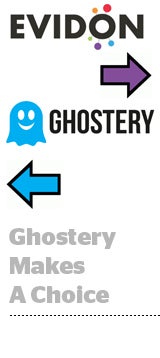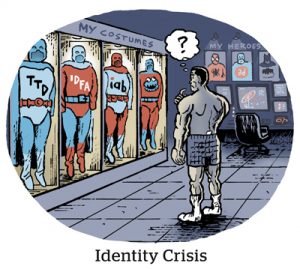Ghostery has decided not to have its cake and eat it too.
On Wednesday, the company announced that it’s been acquired in an all-cash deal by Cliqz, a German privacy-focused browser that plans to use the ad-tracker tool to help expand its user base. The companies did not disclose a deal price.
Hubert Burda Media, one of the largest publishing houses in Germany, maintains a majority stake in Cliqz, which is also backed by Mozilla.
The Ghostery business will split along a clear seam: The consumer-facing privacy extension will go to Cliqz, while the B2B digital governance side of the business will function as a separate entity under Evidon, the company’s original name.
Balancing the two businesses had proven to be a little awkward for Ghostery over the years. There were some who accused it of functioning as an ad blocker while at the same time making the bulk of its money helping companies comply with the Digital Advertising Alliance’s AdChoices and self-regulatory programs across desktop, mobile and video.
But it wasn’t a conflict of interest that led to the sale, said Scott Meyer, Evidon’s CEO and co-founder. It was just good business and parallel interests, he said.
“The combination of how Ghostery empowers users to block trackers is in perfect alignment with the anonymization features built into Cliqz,” Meyer told AdExchanger. “The intention is to make a better user experience, not do anything that would make it harder to sell advertising.”
From Evidon’s perspective, the sale made sense in light of Europe’s General Data Protection Regulation (GDPR) – set to take effect next year – as well as increasing scrutiny from US regulatory agencies of cross-device tracking.
Companies are going to have a lot of compliance boxes to tick, and all of Evidon’s revenue comes from digital governance.
Ghostery once attempted to package and sell the anonymized browsing data it collected through its plug-in to help publishers and advertisers get a handle on data leakage, but the competitive intel product never took off.
Cliqz will keep the Ghostery plug-in running and current users won’t be impacted, although the data it collects will now be housed in Germany, a country known for having some of the strictest privacy laws in the world.
The Ghostery plug-in has more than 10 million monthly active users, roughly 20% of who opt in to allow Ghostery to anonymously track and aggregate their browsing history. Evidon will still be able to use some of that aggregated tracker data as part of enterprise digital governance business.
But over time the plug-in data contributed by Ghostery was becoming less important to the compliance product, said Meyer, who noted that Cliqz will be able to make better use of it as part of it own privacy-friendly tracking and blocking product.
What Evidon isn’t selling is its script library of more than 4,000 companies, which it will continue to license to publishers and advertisers. That IP allows Evidon to determine the provenance of specific tags, whether the tags are running in a secure environment and whether they’re causing latency. Cliqz will be able to access the script library through a long-term license as part of the Ghostery deal.
The Ghostery plug-in only provides a list of which companies have tags present on a site, which isn’t all that useful for an enterprise customer, Meyer said.
As they part ways, it now looks like Ghostery and Evidon both have more comfortable and less conflicting niches to inhabit: the worlds of anti-tracking tools and self-regulatory infrastructure and management.
“What’s happening with [Europe’s] GDPR and the growing focus on cross-device and privacy is an increased amount of attention from regulators into the complexities of the digital supply chain,” Meyer said. “Those two issues have come together to catalyze our business.”
Cliqz’s plans for Ghostery, on the other hand, center around what it calls the human web, a process by which users share probabilistic data fed into an algorithm that automatically detects and overwrites potential identifiers in the data submitted to trackers.
Algorithmic blocking complements Ghostery’s list-based approach of blocking tracking scripts, said Cliqz founder Jean-Paul Schmetz.
“For services such as search, anti-tracking and anti-phishing, you need a lot of data,” Schmetz said. “We get these data from the community of our users – Cliqz users and, in the near future, from Ghostery users – [who] can help to create a better web by voluntarily contributing statistical data. To assess the relevance and security of websites, we simply don’t need to know anything about you.”















